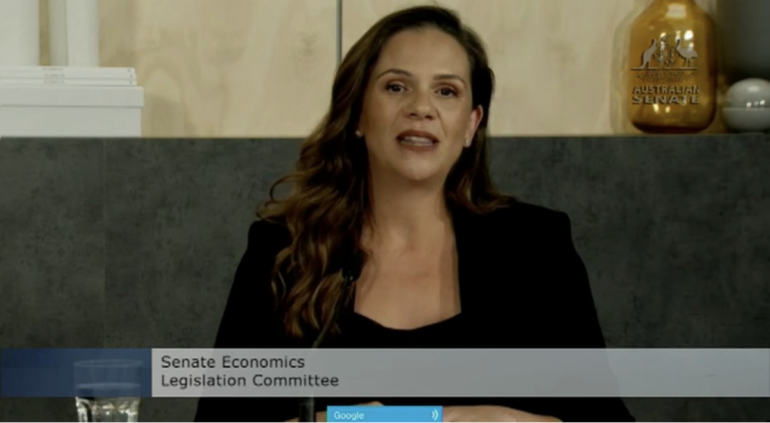Google Australia and New Zealand managing director Mel Silva
Image: APH
Google has said it may have no other choice than to pull its Search function from Australia if the News Media Bargaining Code goes ahead in its current form.
Google, alongside Facebook, has been engaged in a stoush with the Australian Competition and Consumer Commission (ACCC) since August over the code that entered the House of Representatives in late December.
The bargaining code, according to the government, is necessary to address the fundamental bargaining power imbalances between Australian news media businesses and major digital platforms.
But according to Google, the code is “unfair” as it puts the “way Aussies’ search at risk”. Google believes it contains an unfair arbitration process that “ignores the real-world value Google provides to news publishers and opens up to enormous and unreasonable demands”.
Speaking before the Senate Economics Legislation Committee on Friday, Google Australia and New Zealand managing director Mel Silva said her company is most concerned with the code’s requirement to pay for links and snippets in Search.
She said this requirement would set an untenable precedent for her business and the digital economy, which echoed remarks from other submissions made to the committee that the code is not compatible with how search engines work or how the internet works.
See also: Web inventor concerned new Australian code breaches internet’s fundamental principle
“The principle of unrestricted linking between websites is fundamental to Search and coupled with the unmanageable financial and operational risk, if this version of the code were to become law, it would give us no real choice but to stop making Google Search available in Australia,” she said.
“That would be a bad outcome for us, but also for the Australian people, media diversity, and the small businesses who use our products.
“The free service we offer to Australian users and our business model has been built on the ability to link freely … this is a key building block of the internet. Withdrawing our services from Australia is the last thing that I or Google want to have happen, especially when there is another way forward.”
Senators referred to Silva’s remarks as blackmail and while she did not deny such a thing, she said pulling Search is the “worst case scenario”.
“We, like any rational business, needs to assess the impact of any legislative change on our business, our product, and our operations. It is the only rational choice if this law were to pass, for us,” she said.
“We’ve assessed the impact of this legislation on our business and it is untenable risk for our Australian operations.
Google is proposing technical amendments that would allow it to pay publishers for value, without breaking Search.
One such amendment is to allow News Showcase. A workable code, Google said previously, would guarantee remuneration of news media businesses by designating News Showcase — which it has paused from launching in Australia — and similar offerings featuring licensed news content.
“Payment for deals in News Showcase would operate to ensure payment for commercial value,” Google said in its submission to the committee. “Binding arbitration and the application of minimum obligations to News Showcase agreements under the code would ensure a framework for good faith negotiations.”
Silva said Google had struck seven deals with Australian publishers under News Showcase before it paused the rollout due to negotiations on the code. She said Google has made a 25% good faith payment to those seven publishers, despite the program not going ahead.
Silva said Google would “love” to continue making deals under Showcase in Australia, but the code is making that difficult.
“We’ve been trying to do those deals — the connection of Google Search as the designated product, as well as its tie to the arbitration criteria, means its nigh impossible to get those Showcase deals done,” she said.
“We have done deals through Showcase but the way the code is written now, a publisher can look at that and if we don’t make an offer that’s valuable for them, they can go and arbitrate on Search in a one-sided process with costs and criteria that’s heavily skewed in their favour.
“Even in our discussions to-date — we’ve had several conversations which are ‘Oh, I’d like to do a Showcase deal’ to ‘Nah, I might just wait to see what I can get through the code’.”
She said a workable way forward would be to designate Showcase for the remuneration and arbitration provisions of the code, and allow Google Search to be designated for the minimum standards, allowing for algorithm transparency and other minimum standards to apply to Google Search.
See also: Labor logic: Newspapers screwed up online classifieds so tech giants should pay up
The original code was meant to be voluntary, but the government decided to step in due to a lack of an agreement being reached. Silva on Friday clarified a few steps neglected by Treasurer Josh Frydenberg when announcing the intervention by the ACCC.
“We received the government’s recommendations back in December [2019] with the goal of developing a voluntary code of conduct by the end of November 2020. The first significant milestone was the production of a progress report to the ACCC, which was due in April. We had held 27-ish meetings with publishers to try and figure out the process … however, two weeks before that substantive report was due … we received word the government had made the decision to move to a mandatory code,” Silva said.
“We were surprised … our goal was to have a voluntary code in place by November.”
Over in Europe, Google has struck a deal with a group of French publishers, with the Alliance de la Presse d’Information Generale agreeing to a framework that will allow the search giant negotiate individual licensing deals.
According to the Associated Press, Google has already negotiated a few individual payment deals with some French news publishers such as daily paper Le Monde and magazine l’Obs.
The company was forced to negotiate with publishers and news agencies for reusing their material online under a “neighboring rights” law that took effect after France became the first country to adopt new European Union copyright rules.



